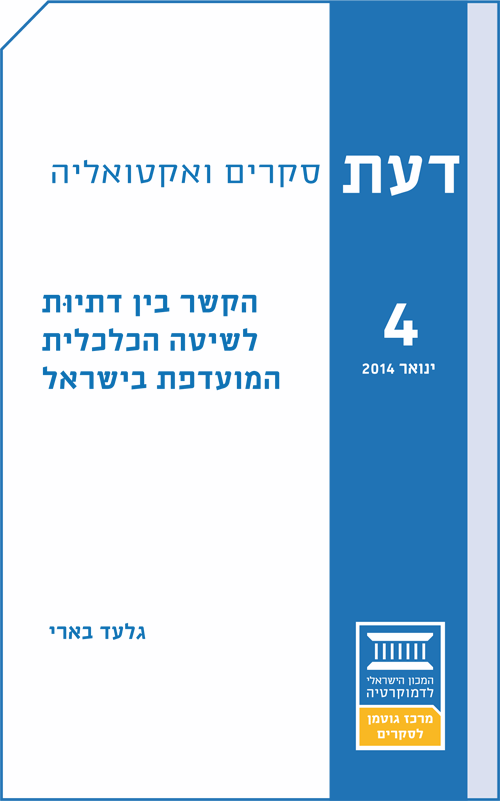The Relationship between Religiosity and the Preferred Economic Regime in Israel
Da'at 4, January 2014
- Written By: Gilad Be'ery
- Publication Date:
- Cover Type: Online Booklet
- Number Of Pages: 17 Pages
A report by IDI's Guttman Center for Surveys on the identification with capitalism and socialism among Jews of different levels of religious observance in Israel (1968 to 2013).
At its start, modern social science research explored the link between religion and economics. In recent years, this topic has been revisited in international research, on both the theoretical and empirical levels. In Israel, this question became especially relevant in light of the religious community's reservations about participating in the social protest of the summer of 2011.
This paper sheds light on this issue through data that was gathered in surveys conducted by IDI's Guttman Center for Surveys from 1968 to 2013. The surveys examined the identification of respondents with one of the two major economic systems: capitalism and socialism.
The data indicate that there have been two distinct periods with regard to this issue. Prior to the year 2000, religious Israelis either tended to identify with capitalism or there was no discernible difference between their preference and the preference of secular Israelis.
Since the turn of the century, however, there has been a significant change: religious Israelis—especially members of the ultra-Orthodox community—have begun identifying more strongly with socialism than their secular counterparts. This finding is especially surprising in the case of the ultra-Orthodox community in Israel because of the historical association between socialism and secularism. It is this author's opinion that this trend may be explained by the desire of the ultra-Orthodox community—a community in which a majority of people live below the poverty line—to receive state funding.
The religious community's growing identification with socialism, which emerges from the surveys, makes the fact that the community distanced itself from the 2011 social protest surprising. It also supports the assertion that the religious community's attitude towards the social protest was not a reflection of the community's identification with conservative economics, but rather was related to sociology and the political context in which the protest took place. The fact that the community took exception to the social protest may also reflect an ideological objection to the placement of an issue that is perceived to be purely material at the top of the public agenda.

